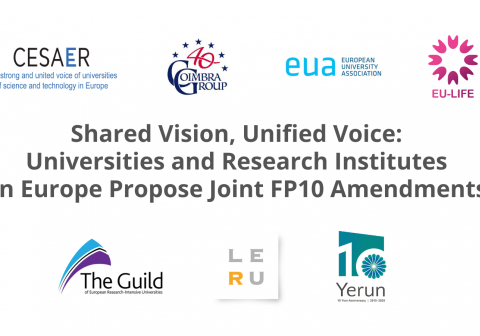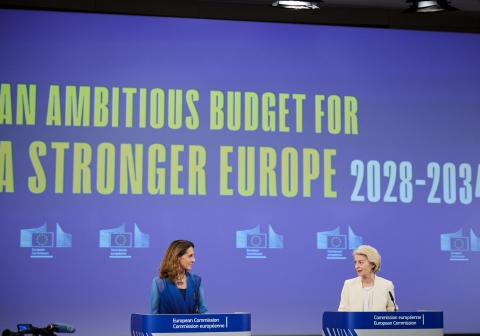As an alliance of excellent performing life-science research institutes in Europe, EU-LIFE is committed to teaming up with European institutions and relevant stakeholders to promote better research value in and for Europe. This includes contributing to the public debate and working directly with policymakers for the development of research strategies and concomitant frameworks that deliver science-based solutions to the citizens.
Special attention has been given in participating at an early stage in European-level dialogue on EU framework programmes in many ways, i.e.:
- providing input to policymakers and advocating for our vision on key priorities;
- reinforcing scientific excellence;
- creating a broader definition of impact to support breakthrough scientific discoveries;
- investing in efficient models to connect research and professional knowledge transfer;
- enabling outstanding science and innovation in all corners of Europe;
- attracting and training the next generation of scientists.
EU-LIFE makes regular contributions to help shape the European research landscape, particularly with regard to excellent science in Europe, the successive framework programmes for research and innovation, and the development of the European Research Council (ERC). Some of our latest actions are highlighted below.
Excellent science in Europe
- Providing input to the European Commission about how to strengthen Europe's competitiveness through the European Life Sciences Strategy
- Sharing EU-LIFE views on research excellence from an institutional perspective through position papers and reports such as "The future of European research: 5 key actions for a competitive Europe"
- Contributing to the European Research Area
- Engaging in the European Commission's policy dialogue regularly, including the participation in high-level meettings and the publication of position papers and open letters to commissioners.
- Providing feedback to the European Commission's consultations about the next Multiannual Framework Programme (MFF), including recommendations to place R&I at the heart of Europe's economy.
- Advocating for the role of independent research institutes with initiatives like the publication of the EU-LIFE Charter of Independent Life Science Research Institutes
- Standing for UK’s participation in Horizon Europe through direct contact with political leaders, our own statements and different joint actions with other stakeholders such as the #DealForScience and the #StickToScience campaigns. We also released a joint statement addressed to the European Commission by over 200 institutions representing the European research and innovation community
- Engaging in dialogue about innovative technologies and scientific methodologies that raise ethical concerns through initiatives such as the European Sustainable Agriculture through Genome Editing (SAGE) and “The use of animals for the generation of high-quality antibodies remains necessary for research and therapeutic applications”
EU Framework programmes
- Putting forward recommendations and conveying EU-LIFE's vision for FP10:
- Towards FP10: EU-LIFE’s guiding principles for FP10
- Towards FP10: EU-LIFE’s vision for Marie Skłodowska-Curie Actions (MSCA)
- Towards FP10: EU-LIFE’s vision for the European Innovation Council (EIC)
- Towards FP10: EU-LIFE reply to High-Level Group Consultation on HE and FP10
- Providing input into the formulation of the concept of the European Innovation Council
- Contributing regularly in the shaping of the Horizon Europe programme
- Taking part in joint advocacy campaigns such as We need much more MSCA and Research Matters
- Involvement in the discussions on Health Cluster strategic programming with several papers and statements such as the “EU-LIFE calls for impactful collaborative research in European biomedicine”
- Reacting to the Horizon Europe’s Cancer Mission proposal by issuing a statement and additional recommendations
- Participating as stakeholders in European Commission events in the design of the EU4Health Programme
- Promoting geographical diversity by raising the visibility of the EU-LIFE institutes based in widening countries
ERC
- Supporting ERC’s vision and priorities, and enrolling in regular discussions about its mission
- Nominating ERC members and president, in the context of our regular actions in search of opportunities for researchers to play prominent roles in EU policy
- Submitting concrete proposals on challenging aspects of ERC
- Conducting public campaigns with ERC and other stakeholders with the aim to give visibility to ERC’s impact in science and society
Innovation in Europe
- Contributing to the concept and implementation of the European Innovation Council (EIC), interacting regularly with EIC:
- Towards FP10: EU-LIFE’s vision for the European Innovation Council (EIC) (Mar 2024)
- Reaction to the European Innovation Council Board’s statement on intellectual property (Jun 2023)
- Call for the European Commission to apply standard Intellectual Property Provisions in European Innovation Council (EIC) projects (Dec 2022)
- On the concept of an European Innovation Council (May 2016)
- Putting forward recommendations and conveying EU-LIFE's vision for the EU innovation ecosystem:
- EU-LIFE's 4 elements to strengthen Europe's competitiveness through the European Life Sciences Strategy (Apr 2025)
- The future of European research: 5 key actions for a competitive Europe (Oct 2024)
- EU-LIFE’s vision for the next European Programme FP9: The next Horizon - Strategies to promote European competitiveness in innovation (Jan 2017)
- Interacting regularly with innovation leaders of the biotech sector, such as the 'Fundamental research for a global world' exchange session held during the EU-LIFE Strategy Meeting 2024 in Copenhagen, and the 'Fundamental science for EU competitiveness' social media campaign.
- Sharing technology transfer good practices among the EU-LIFE member institutes through the work of the EU-LIFE Tech Transfer Working Group (TT WG), including the annual EU-LIFE Pitching Event to provide scientists with opportunities to talk confidentially to venture capitalists, receive feedback on their ideas, and gain insight about how to establish a new venture.



